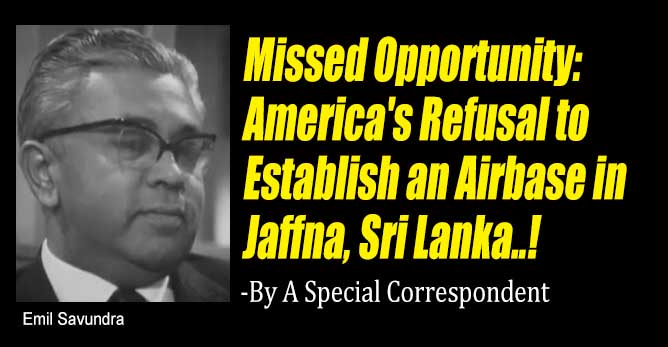-By A Special Correspondent

(Lanka-e-News -22.Feb.2024, 10.30 PM) In the realm of geopolitics, decisions often have far-reaching consequences, shaping the trajectory of nations and regions for years to come. One such decision, which continues to haunt the corridors of power, is America's refusal to accept an offer from Emil Savundra to establish an airbase in Jaffna, Sri Lanka. This decision made decades ago, still reverberates as a missed opportunity with significant implications for global security and strategic interests.
Emil Savundra's journey from a Tamil family in colonial Ceylon to a visionary with aspirations to establish a US airbase in Jaffna is a tale of ambition and strategic foresight. Despite facing rejection from the Royal Air Force during World War II, Savundra's determination remained unshaken.
Savundra's life was marred by controversies, including his involvement in economic sabotage and convictions for fraud. From his role in the sabotage of a Chinese oil shipment to his involvement in high-profile scandals in Belgium and the United Kingdom, Savundra's past was checkered with legal troubles and moral ambiguities.
In a surprising turn of events, Savundra proposed the establishment of a US airbase in Jaffna to the US ambassador in London. This proposal, backed by the offer of his wife's ancestral land, presented a unique opportunity for the US to strengthen its strategic presence in the Indian Ocean region.
Despite the potential strategic advantages, the US Defense Department rejected Savundra's proposal - a decision that would later be met with regret. The subsequent events, including the Afghanistan war and the Tamil Eelam conflict, underscored the missed opportunity and the strategic implications of the rejected proposal.
With hindsight, the decision to reject Savundra's proposal appears shortsighted. The vital usage of a Sri Lankan airbase during the Afghanistan war highlights the strategic importance that such a base could have offered. The rejection of the proposal continues to haunt the US Defense Department, serving as a cautionary tale of missed opportunities in geopolitics.
Had the airbase been established, it could have served as a cornerstone for Sri Lanka's membership in the Indo-Pacific alliance. Such an alliance would have bolstered regional security and cooperation, countering emerging threats and challenges in the region.
The rejected airbase proposal in Jaffna stands as a testament to the complexities of geopolitics and the significance of strategic foresight. Savundra's vision, though met with rejection, highlights the importance of seizing opportunities that align with long-term national interests. As geopolitical dynamics continue to evolve, the lessons from this episode serve as a reminder of the enduring impact of decisions made—or rejected—in the realm of strategic planning and national security. In today's rapidly evolving geopolitical landscape, the establishment of a US airbase in Jaffna could have positioned Sri Lanka as a key player in the Indo-Pacific alliance. Such a strategic location would have bolstered regional security and cooperation, offering significant advantages in the face of emerging threats and challenges.
-By A Special Correspondent
---------------------------
by (2024-02-22 17:37:11)
Leave a Reply